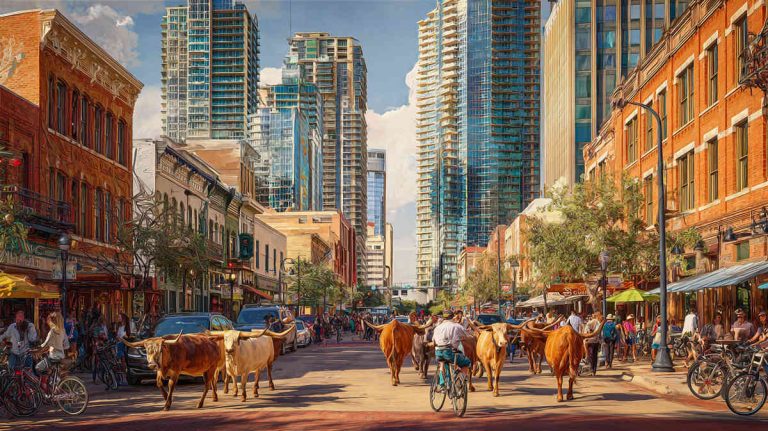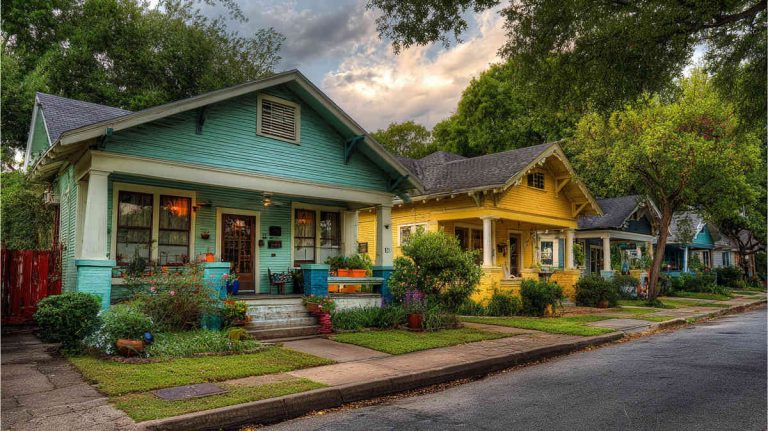Pull up a chair and let’s talk plain numbers, real budgets, and the everyday dollars-and-cents reality of Fort Worth, Texas. You’ll walk away knowing whether your paycheck can breathe easy here or if you’ll need to get crafty with coupons and side hustles. No fluff. No glossy brochure language. Just the messy truth about life in Cowtown—2025 edition.
First Things First: Why Fort Worth Still Pulls People In
Fort Worth keeps growing. The latest data points to the population tipping past 960,000, and the metro area isn’t slowing down. Folks relocate for a lot of reasons—oil and gas gigs, aerospace work, tech contracts up the road, or simply to stick close to Dallas without paying Dallas prices. Net migration numbers are still in the green, though pace has cooled a hair since 2022.
What’s wild is how 2025 looks different from even last year. Interest-rate whiplash? Yep. Supply chain hiccups? Still hanging around. Yet the overall cost of living runs roughly 4 percent below the national average. That gap is slim, but it’s real money. Groceries, housing, even a night at the Stockyards—it all feels slightly lighter on the wallet than many coastal hot spots.
Housing & Utilities: The Biggest Slice of Your Budget Pie
Let’s rip off the band-aid and face the largest line item first.
• Median home price inside Fort Worth city limits: about $355,000 so far in 2025. That’s a 3 percent bump year-over-year, small compared to the 17 percent rocket jump we saw back in 2021.
• Typical 3-bed rental: floating around $2,050 a month. Studios can still be found in the $1,200 ballpark but don’t expect granite countertops at that price.
How does that stack against the wider Lone Star State? Austin sits near $488K for a median sale right now. San Antonio hovers just above $325K. Dallas is flirting with $400K. In short, Fort Worth lands on the affordable side of the “big-city Texas” scale but not quite bargain-bin territory.
Utilities are a mixed bag:
• Electricity averages 14.1 cents per kilowatt-hour this year. Summer usage hurts, so plan on $175–$220 per month if your AC runs non-stop.
• Water, sewer, trash combined: around $85 for a single-family place with modest lawn watering.
• Internet: fiber plans compete hard, starting near $55 for 1 Gbps. Cable packages still linger closer to $70.
Tag these to your mortgage or rent and you’ll see housing plus utilities swallowing roughly 34–37 percent of an average Fort Worth household income. That ratio is comfortably under the 45-plus percent some coastal residents face.
Taxes: The Part No One Loves but Everyone Pays
Texas likes to brag about zero state income tax. Great headline, sure, yet the missing revenue shows up in other spots.
Sales tax inside Fort Worth currently tallies 8.25 percent. That covers city, county, and state bites. Swipe your card at a furniture store for a $2,000 sofa and watch $165 vanish into thin air.
Property tax hits harder. Tarrant County’s average effective rate sits near 2.1 percent. Translation: a $355K home could run an annual tax bill in the $7,000 neighborhood, give or take exemptions. Homestead status chops that a bit, senior exemptions chop it more, but the bill never completely disappears.
Compare to nearby Parker County at roughly 1.7 percent or the pricier Collin County (hello, Plano) closer to 2.3 percent and you’ll see Fort Worth smack in the middle. Newcomers from places like California often gasp at that number, but remember they left behind state income tax brackets pushing 9–13 percent. For many, it levels out.
Pro tip for future buyers: dig into city improvement districts. Certain neighborhoods tack on extra levies that hide inside your mortgage escrow. Always crack open the fine print.
Groceries, Farmers Markets, and the “What’s for Dinner?” Question
A household of two can fill a cart for roughly $550 a month if they stick to big-box chains. Organic-leaning families report closer to $780. H-E-B just crashed the Fort Worth scene with a newly opened megastore off Alliance Gateway. Prices there undercut Whole Foods by a solid 12–14 percent according to this quarter’s basket comparison.
Hidden savings live at:
• Ridgmar Farmers Market on Saturdays. Seasonal produce priced by local growers, minimal overhead.
• Fiesta near Hemphill for bulk rice, beans, and spices far cheaper than typical suburban grocers.
• Costco in North Fort Worth. Yes, that rotisserie chicken still holds the $5 line… for now.
Eating out? A mid-level dinner for two runs $70 after tip. Taco trucks shaving brisket at midnight? Fifteen bucks feeds you and a sleepy friend. Entertainment districts like West 7th slip toward $12 cocktails, so pace yourself.
The Fun Stuff: Entertainment and Leisure Splurges
Fort Worth isn’t shy about options. Rodeo at Dickies Arena, Broadway touring shows, indie rock at Tulips—pick your poison. Tickets vary wildly. Floor seats at the championship rodeo this year? Around $118 each. Yet an outdoor show at Panther Island Pavilion might cost just $35.
What surprised recent transplants the most? Free events persistent all year:
• Outdoor film screenings on Magnolia Avenue.
• Monthly gallery walks in the Near Southside arts pocket.
• Symphony’s Concerts in the Garden series offering lawn sections if you BYO blanket.
Museums along the Cultural District stretch occasionally drop admission fees on “community days,” worth marking in your calendar. Add these freebies to your calendar and you can knock leisure spending down by hundreds over 12 months.
Fuel, Transit, and Getting Around Without Melting in August
Gas prices hover near $3.18 a gallon right now, about 15 cents above the statewide average thanks to urban demand. Commuters driving 45 minutes each way from the far suburbs might burn $260 in fuel monthly.
Fort Worth’s TEXRail hits the airport for $2.50 per ride. Trinity Metro buses cost $5 for an all-day pass. Monthly unlimited: $80. If your job sits anywhere near downtown or along the Medical District, that pass could slice a noticeable chunk off your auto expenses.
Electric vehicles? The city has ramped up public Level 2 chargers, now topping 230 ports. Most are still pay-to-plug at roughly 14–17 cents per kWh—cheaper than gas if you don’t mind hunting open stalls.
Eyes on the horizon: advanced toll lanes on I-35W northbound finish their next expansion phase late 2025. Expect fees to rise once that ribbon is cut. Commuters in those corridors should budget a little extra.
The Bigger Picture: How All These Costs Stack Up
Crunching every category—housing, food, transport, healthcare, entertainment—plops a typical Fort Worth household at 96 on the national cost-of-living index where 100 equals the U.S. average. Short version? Slightly cheaper overall but not bargain basement.
Salaries keep pace. Median household income now ticks around $79,200. Many dual-income buyers say the sweet spot hits when combined earnings crest $95K. At that level, mortgage payments, insurance, groceries, and an occasional Stockyards date night feel comfortable instead of tight.
Students fresh out of University of North Texas Health Science Center or TCU often share rentals, lean on TEXRail, and stick with cheap lunch spots downtown. They survive on $42K starting salaries by hacking away at non-essentials. It’s doable, but every Starbucks run counts.
Want to Game the System? Practical Money Moves
1. Hunt neighborhoods just past established “hot zones.” Wedgwood and Meadowbrook list homes around 15 percent less than comparable Near Southside bungalows and are still ten minutes from downtown.
2. Time your energy plan. Electricity providers here lock in fixed rates. Sign up early spring before summer demand spikes, and you’ll often shave 2–3 cents off per kWh.
3. Snag homestead exemptions the instant you qualify. Online filing takes fifteen minutes and saves a four-figure chunk on property tax bills.
4. Say “yes” to free city resources. Fort Worth Public Library has no-cost maker spaces and 3D-printing hours. Your kids’ science fair budget will thank you.
5. Keep your receipts. The state’s annual back-to-school sales-tax holiday includes clothing under $100, some backpacks, even computer accessories. Adults can buy during that weekend too.
Ready to See It in Real Life?
Numbers on a screen help, but nothing beats breathing in the dry cedar smell during a stock show or feeling that summer heat roll off the Trinity River. If Fort Worth curiosity has you refreshing Zillow every night, let’s chat. We can pull up targeted listings, run side-by-side cost comparisons, and map your commute before you spend a dime on movers. Slide into the conversation whenever you’re ready.
Rapid-Fire FAQs
1. What unique economic shifts push Fort Worth’s cost of living in 2025?
New aerospace contracts at Alliance, steady energy hiring, and a tech-startup influx keep wages growing. Slower construction starts have stabilized housing prices versus the 2021 surge.
2. How does Fort Worth real estate compare to nearby big cities?
Median prices land roughly $30K under Dallas, $130K under Austin, and about $25K over San Antonio. Inventory turnover is quicker than Dallas but slower than Austin’s frenzy.
3. Are there special incentives for first-time buyers today?
Yes. Tarrant County’s Home Sweet Texas program offers down-payment assistance up to 5 percent of the loan, subject to income limits and a short homeowner education course.
4. Which local amenities can sneak extra costs into my budget?
Master-planned communities with private pools or gated patrols often collect homeowners association dues north of $1,000 yearly. Always ask for the fee sheet.
5. Does public transit meaningfully cut transportation costs?
For residents living within five miles of downtown, monthly Trinity Metro passes can drop commute spending by 40 percent compared to driving alone, especially when factoring parking garages that demand $120 or more per month.





